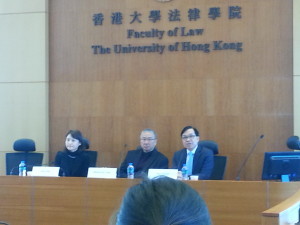After some welcome words of Professor Michael Hor (photo middle), the relatively new Dean of the Faculty of Law of HKU, Professor Paul Cheung (photo: right), Associate Vice President, Director of HKU Tech Transfer Office, talked briefly about the relationship of patents and innovation in China. He argued that the growth in the Chinese patents was indicative of the growth in innovation. (I would like to add to Professor Cheung’s words that the lion’s share of the patents or utility model patents and not invention patents, and that the quality of the patents might be very low since provincial and municipal governments provide subsidies for patents. A better yardstick might be the registration of patents by Chinese persons and companies abroad).
Then Ms Ada Leung (photo), the new Director of Hong Kong Intellectual Property Department (IPD) spoke about the 2011 public consultation on plans for the introduction of an Original Grant Patent (OGP) system in Hong Kong. At the moment the IPD can only re-register patents that were examined and granted by the Office for the Harmonisation of the Internal Market (OHIM), United Kingdom’s Intellectual Property Office (IPO) or China’s State Intellectual Property Office (SIPO). Via the public consultation the IPD is listening to the arguments of scholars, practitioners, interested parties and the public to find out the following: – whether Hong Kong IPD should be able to register OGPs, next to re-registering patents that have been granted by OHIM, IPO or SIPO; – and in case the answer is yes, whether Hong Kong should be able to do the examination themselves, which means acquire the knowledge and experience, or outsource it to a place that has the knowledge and experience. Ms Leung announced that in the first half of 2015 a new bill will be announced, which takes into account the comments of the public consultation. It seems that Hong Kong will choose for an OGP system next to the possibility of re-registration and is willing to build up the expertise in examination from scratch. Ms Leung told that the plan is that SIPO will help IPD with building up the expertise. This is a surprising choice given SIPO’s backlog and the alternatives of places that can help Hong Kong up to speed to set high standards of examination so that quality patents will be granted. See more of the Worldwide Patent Law Reform and Hong Kong’s Response Workshop here: http://www.ipdragon.org/2015/01/17/worldwide-patent-law-reform-and-hong-kongs-response-hku-workshop/.

